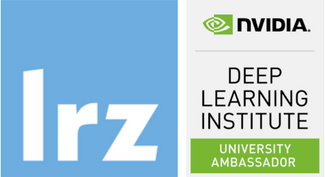2024-03-05 DLI Training Series - Applications of AI for Anomaly Detection (hdli5w23)
| Course | DLI Training Series - Applications of AI for Anomaly Detection |
| Number | hdli5w23 |
| Available places | 9 |
| Date | 05.03.2024 – 05.03.2024 |
| Price | EUR 0.00 |
| Location | Leibniz Rechenzentrum Boltzmannstr. 1 85748 Garching b. München |
| Room | Kursraum 2 |
| Registration deadline | 27.02.2024 23:59 |
| education@lrz.de |
Contents
Whether your organisation needs to monitor cybersecurity threats, fraudulent financial transactions, product defects, or equipment health, artificial intelligence can help catch data abnormalities before they impact your business. AI models can be trained and deployed to automatically analyse datasets, define “normal behavior,” and identify breaches in patterns quickly and effectively. These models can then be used to predict future anomalies. With massive amounts of data available across industries and subtle distinctions between normal and abnormal patterns, it’s critical that organisations use AI to quickly detect anomalies that pose a threat.
In this workshop, you’ll learn how to implement multiple AI-based approaches to solve a specific use case of identifying network intrusions for telecommunications. You’ll learn three different anomaly detection techniques using GPU-accelerated XGBoost, deep learning-based autoencoders, and generative adversarial networks (GANs) and then implement and compare supervised and unsupervised learning techniques. At the end of the workshop, you’ll be able to use AI to detect anomalies in your work across telecommunications, cybersecurity, finance, manufacturing, and other key industries.
The course is part of a training series co-organised by LRZ and NVIDIA Deep Learning Institute (DLI). All instructors are NVIDIA certified University Ambassadors.
Learning Objectives
By participating in this workshop, you’ll:
- Prepare data and build, train, and evaluate models using XGBoost, autoencoders, and GANs
- Detect anomalies in datasets with both labeled and unlabeled data
- Classify anomalies into multiple categories regardless of whether the original data was labeled
Important information
After you are accepted, please create an account under courses.nvidia.com/join.
Ensure your laptop / PC will run smoothly by going to http://websocketstest.com/ Make sure that WebSockets work for you by seeing under Environment, WebSockets is supported and Data Receive, Send and Echo Test all check Yes under WebSockets (Port 80).If there are issues with WebSockets, try updating your browser.
NVIDIA Deep Learning Institute
The NVIDIA Deep Learning Institute delivers hands-on training for developers, data scientists, and engineers. The program is designed to help you get started with training, optimising, and deploying neural networks to solve real-world problems across diverse industries such as self-driving cars, healthcare, online services, and robotics.
Prerequisites
- Professional data science experience using Python
- Experience training deep neural networks
Hands-On
The lectures are interleaved with many hands-on sessions using Jupyter Notebooks. The exercises will be done on a fully configured GPU-accelerated workstation in the cloud.
Language
English
Lecturers
PD Dr. Juan Durillo Barrionuevo (LRZ, NVIDIA certified University Ambassador)
Prices and Eligibility
The course is open and free of charge for people from academia from the Member States of the European Union (EU) and Associated Countries to the Horizon 2020 programme.
Registration
Please register with your official e-mail address to prove your affiliation.
Withdrawal Policy
See Withdrawal
Legal Notices
For registration for LRZ courses and workshops we use the service edoobox from Etzensperger Informatik AG (www.edoobox.com). Etzensperger Informatik AG acts as processor and we have concluded a Data Processing Agreement with them.
See Legal Notices
| No. | Date | Time | Leader | Location | Room | Description |
|---|---|---|---|---|---|---|
| 1 | 05.03.2024 | 10:00 – 17:00 | Juan Durillo Barrionuevo LRZ Events | Leibniz Rechenzentrum | Kursraum 2 | Lecture |





